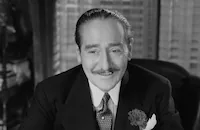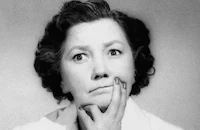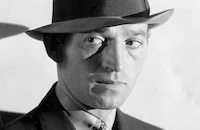Road Show

Brief Synopsis
Cast & Crew
Hal Roach
Adolphe Menjou
Carole Landis
John Hubbard
Charles Butterworth
Patsy Kelly
Film Details
Technical Specs

Synopsis
Millionaire Drogo Gaines has such a bad case of cold feet on his wedding day that he pretends to have a nervous breakdown. Drogo recovers after he overhears his fiancée, Helen Newton, and her mother and brother Ed lamenting the fact that they will lose Drogo's fortune, and he tells Helen the wedding is off. Helen refuses to be jilted at the altar, however, and attacks Drogo and makes it look as if he has gone crazy. Drogo is then knocked out by Ed, and later awakens in a mental institution, where the doctor insists he is insane. That night, Drogo and Col. Carleton Carraway, a formerly wealthy eccentric who admitted himself to the hospital, escape by rowboat, and are later picked up by carnival operator Penguin Moore. When Penguin arrives at the carnival site, the sheriff demands $120 in water and electricity fees from her. Penguin is broke, so Drogo pays the sheriff with his last few dollars. When the independently-minded Penguin protests, Drogo suggests she give Carraway a concession for his special camera in exchange for the money. Shortly after, the lot owner demands more money for rent, so Drogo and Carraway cleverly raise the money with a shell game. Drogo and Carraway are arrested, but Penguin busts them out of jail. Along the way to the next site, police searching for the asylum escapees pull Penguin over. Carraway and Drogo hide, and narrowly escape being seen by Helen, who has accompanied the police. Drogo's personal secretary, Stanhope, sees his boss, however, and stays behind with the carnival. Drogo, tired of being romanced by gold diggers, falls in love with Penguin, who thinks "gentlemen" are loafers. Penguin insists that Drogo and Carraway earn their keep, and puts them to work pounding tent stakes. The carnival continues to lose money and is unwelcome in most towns. To help Penguin, Drogo secretly sends Stanhope to purchase and equip a new carnival. Penguin, meanwhile, promotes Drogo as her aerial acrobatics assistant, but loses respect for him when his incompetence ruins her act. Carraway tries to repair Drogo's reputation by claiming that he was once a famous lion tamer, and feeling a newfound respect for Drogo, Penguin surprises him by buying a pair of lions for his own act. A terrified Drogo gets a reprieve from his first experience at lion taming when a sudden storm shuts down the carnival. Carraway then arranges for the carnival to encamp at his wealthy nephew Harry Whitman's estate. Harry's guests attend the carnival, but they are terrified when Drogo's lion follows him out of the cage. After Willie, the reluctant lionkeeper, draws the lion back into its cage, the concessions are broken up by an outsider who resents the higher prices being charged because of the private party. A brawl ensues during which the carnival is destroyed, but Harry promises to cover the expenses after they succeed in driving out the thugs. That night, Carraway has the remaining equipment stored in the barn, knowing that Harry will burn it so he can take out his full complement of fire trucks and douse the blaze, as is his nightly habit. When the barn is ignited, Penguin believes that she has lost everything. To her surprise, Drogo directs the fire trucks away from the barn to a fully operational carnival he purchased for her. When Penguin sees the carnival's name, Moore & Gaines, she kisses Drogo to seal the partnership.

Director

Hal Roach
Cast

Adolphe Menjou

Carole Landis

John Hubbard

Charles Butterworth

Patsy Kelly

George E. Stone
Margaret Roach
Polly Ann Young

Edward Norris
Marjorie Woodworth

Florence Bates

Willie Best
The Charioteers
Paul Stanton
Ted Stanhope
Clarence Wilson
Lane Chandler
Jack Norton
Crew
Stanley Adams
Arnold Belgard
Norbert Brodine
Hoagy Carmichael
Bernard Carr
Gordon Douglas
Charles D. Hall
Bert Jordan
Harry Langdon
Kay Nelson
Mickell Novak
William Randall
Hal Roach
Hal Roach Jr.
Harris Robison
Roy Seawright
W. L. Stevens
Georgie Stoll

Film Details
Technical Specs

Articles
Road Show
Road Show was written by men who knew comedy: Eric Hatch, who wrote the original story in 1934 was something of an expert having also written the Oscar® nominated My Man Godfrey (1936) about an oddball rich girl who falls in love with a homeless man she finds during a scavenger hunt. Working on the screenplay was Harry Langdon, who had been a big star in the silent days before his ego and his inability to keep up with the change in audiences' tastes nearly ruined his career. Langdon would work for Hal Roach in later years as a comedy writer and gag man. Also working on Road Show with Roach were his son Hal, Jr., as co-director, and his daughter Margaret, who played Priscilla.
Road Show seems to have been placed on the back-burner for a few years, as a 1937 issue of The Hollywood Reporter announced that Lyda Roberti would be cast in the role of Penguin Moore. Roberti died suddenly of a heart attack in March 1938 at the age of 32 when she stooped to tie her shoe on Hollywood Boulevard. The part would go to Carole Landis, who Roach had given her first starring role the year before in One Million B.C. (1940).
The premise of Road Show has wacky millionaire Drogo Gaines [John Hubbard] pretend to have a nervous breakdown so he can get out of marrying a gold-digger. In revenge, she has him committed to an insane asylum. Gaines escapes with another patient and former millionaire Col. Carleton Carroway [Adolphe Menjou] in a rowboat and the two get picked up by Penguin Moore [Carole Landis], a beautiful carnival owner. The plot becomes more twisted as it goes along involving all sorts of mishaps involving lion taming, brawls, fires, and misunderstandings galore with the inevitable happy ending.
Bosley Crowther, in his February 19, 1941 review of the film, felt that Road Show did not live up to Hal Roach's name. "Any loud noises you might have heard emerging from the Rialto Theatre yesterday were in all probability the thwacking at the slapstick which is continuously applied in Hal Roach's new Road Show plus the occasional laughter of the customers. For Mr. Roach's latest comic effort, compounded out of madness and confusion, strives much harder to be funny than it actually is, and often its figurative flailings strike the funny-bone with little effect. In other words, the slapstick, in this instance, has the shape of a boomerang. And that is passing odd, for Mr. Roach, as everyone knows, is an old hand at farcical contrivance, and the story by Eric Hatch, from which the present film is incubated, provides ample scope for madcap fun. [...] Adolphe Menjou plays the charlatan as though his principal delusion were that he is John Barrymore-a delusion which is imparted to the audience with amusing consequence. Charles Butterworth appears briefly as a wealthy whack who keeps a garage full of fire engines as his favorite form of transportation....But somehow the humors have a way of flattening out before they explode, and most of them have no more point than that on the end of a club. An odd document was handed out to all critics entering the Rialto yesterday-a little something which was described as a "humor quotient certificate." By some queer method, it invited one to test the reaction of one's humor. Maybe we used it incorrectly, but, according to this yardstick, our sense of humor definitely did not measure up to Road Show. Or perhaps it was vice versa."
Producer: Hal Roach
Director: Hal Roach
Screenplay: Arnold Belgard, Harry Langdon, Mickell Novack, Eric Hatch (novel)
Cinematography: Norbert Brodine
Film Editing: Bert Jordan
Art Direction: Charles D. Hall
Music: George Stoll
Cast: Adolphe Menjou (Col. Carleton Carroway), Carole Landis (Penguin Moore), John Hubbard (Drogo Gaines), Charles Butterworth (Harry Whitman), Patsy Kelly (Jinx), George E. Stone (Indian).
BW-87m.
by Lorraine LoBianco
SOURCES:
The New York Times " Road Show , A Slapstick Farce, at the Rialto", Feburary 19, 1941
The Internet Movie Database
www.afi.com

Road Show
Road Show on DVD
As adapted from the novel by My Man Godfrey scribe Eric Hatch, the screenplay opens with marriage-phobic millionaire Drogo Gaines (John Hubbard) faking a nervous breakdown at the altar. His mortified, gold-digging fiancee (Polly Ann Young) decides that if she can't get commitment from him, she'd get commitment for him, and arranges an indefinite stay at the sanitarium. Unable to sell the doctors on his sanity, Drogo makes an ally out of fellow inmate Col. Carleton Carroway (Adolphe Menjou), an affable coot extolling the dubious virtues of his pre-Polaroid instant camera.
Availing themselves of the Colonel's long-sequestered escape route, the pair hitch a ride with a traveling carnival owned by a tough and gorgeous aerialist answering to Penguin Moore (Carole Landis). After finagling their way into staying on with the show as hands, Drogo has to deal with the multiple challenges of preserving his freedom, proving his worth to the skeptical Penguin, and surreptitiously bailing the willful ringmistress out of financial straits. All the threads wind up getting happily resolved in the course of a climactic fire engine chase.
Helping to move the hodgepodge along are assorted original, if lower-tier, compositions by Hoagy Carmichael (Calliope Jane, Yum! Yum!) as delivered by the Charioteers and Roach's daughter Margaret. The supporting cast is peppered with regulars from the Roach lot. Some contributions are more welcome than others, with Charles Butterworth as the Colonel's only slightly less loopy nephew being evidence of the former, and Patsy Kelly, shrill even by her standards as the medicine show barker, evidence of the latter.
The film offers up a nice showcase for Landis, a luminous presence who seldom found opportunities in more prestigious vehicles, and who sadly took her own life at age 29 in the wake of multiple professional and personal setbacks, capped by the end of an affair with Rex Harrison. Hubbard is serviceable as the hapless Drogo, but no more than that; Menjou is effective as the charming Southern eccentric. Ultimately, the best that can be said for Road Showis that it's a shade more memorable than the bulk of the cost-efficient programmers that marked the twilight years of the Roach era.
The DVD itself is bereft of extras, with the most added value represented by the lobby card reproductions offered up in the insert. The video presentation is full screen; the original 35mm nitrate positive master source isn't quite pristine, but certainly better than one would expect given the film's relative obscurity. Similarly, the mono soundtrack has a fair amount of hiss, but not so much as to detract from the presentation.
For more information about Road Show, visit Image Entertainment. To order Road Show, go to TCM Shopping.
by Jay S. Steinberg
Road Show on DVD
Quotes
Trivia
Moe Parker. The character was named after Howard's brother and fellow Stooge, Moe Howard (I).
Notes
A 1937 Hollywood Reporter news item noted that Lyda Roberti was initially cast in the film, and novelist Eric Hatch was going to write the script. Roberti died in 1938, and Hatch's contribution to the final screenplay has not been confirmed. A Hollywood Reporter production chart included Johnny Arthur in the cast, but his appearance in the final film has not been confirmed.















